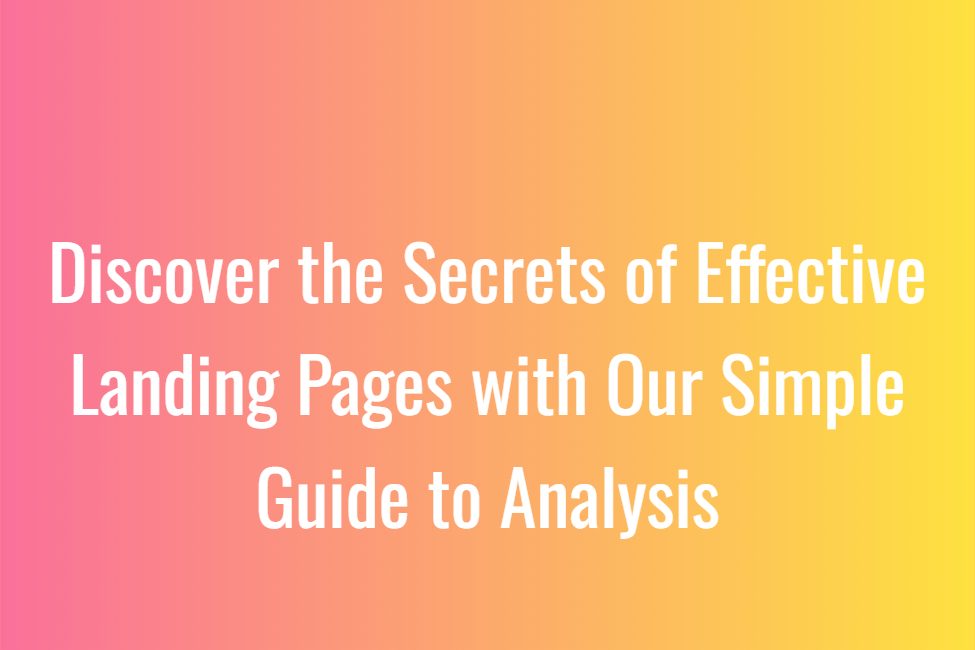A landing page is a standalone web page that allows you to guide visitors into becoming leads and customers. Properly analysing and optimizing your landing pages is crucial for improving conversions and return on investment from digital marketing campaigns. This guide will explore key aspects of conducting landing page analysis to drive more business growth.
Table of Contents

Elements of Landing Page Design
An effective landing page presents a clear visual hierarchy and removes unnecessary distractions so visitors can focus on the intended call-to-action. Here are some key elements of design best practices:
- Visual hierarchy – Create a clear focal point on the page to draw the visitor’s attention and make it obvious what action you want them to take. This can be accomplished through elements like:
- Bold headline
- Prominent call-to-action button
- Strong imagery
- Simple, uncluttered layout – Avoid overloading visitors with too many competing elements on the page. White space is good! Ensure design flows well and removes distractions.
- Relevant, high-quality images – Incorporate visuals like photos, charts, or illustrations that engage visitors rather than generic stock imagery. Ensure it connects to your messaging.
- Consistent branding – Maintain colors, logo placement, and other branded elements to build familiarity and trust.
- Easy-to-find navigation – Menus and calls-to-action should be intuitive for visitors to find. Don’t hide important links at the bottom.
Carefully analyzing how site visitors interact with each of these key landing page elements provides insight to better optimize conversion rates.
Crafting Effective Landing Page Content
You only have a brief window to capture a visitor’s attention and move them towards conversion. Here are proven techniques for landing page content:
- Clear, benefit-driven headline – Summarize the core offering or message clearly in the headline and sub-headline. Focus on communicating concrete benefits.
- Concise, scannable bullet points – Facilitate easy scanning by highlighting offerings, features, or value props in short bullet list form.
- Social proof elements – Build credibility by incorporating metrics, customer testimonials or reviews.
- Clear call-to-action (CTA) copy – Write CTAs that motivate the next step using action words like “Start Today” or “Sign up Now”.
- Balanced text and space – Avoid dense paragraphs. Leave ample negative space so important elements attract visitor attention quickly.
Analyze how visitors are consuming and interacting with each content area by tracking metrics like scroll depth, click-through-rates on links/buttons, and exit rates.
Tracking Conversions and Key Metrics
Install tracking pixels and leverage analytics to unlock the data behind landing pages performance. Key aspects to focus analysis on include:
Identify your conversion goals
- Email sign-ups
- Downloads
- Purchases
- Calculate conversion rate
- (Total conversions / Unique visitors) x 100
| Conversion Type | Goal Number | Current Rates | Benchmarks |
|---|---|---|---|
| Email Subscribers | 500/month | 10% | 25% industry average |
| Trial Sign-ups | 100/month | 5% | 15% industry average |
Monitor engagement metrics
- Bounce rates
- Pages/session
- Average time on page
- Exit rates
Digging into landing pages analytics reveals optimization opportunities tied directly to driving more conversions and revenue.
Optimizing Landing Pages
The key to continual optimization is to test and analyze the impact of changes:
- A/B test page elements – Try different headlines, value proposition messaging, call-to-action copy, image choices and more.
- Ensure mobile responsiveness – Review site on all devices and improve responsiveness for better mobile experience.
- Check page load times – Slow load times increase bounce rates. Compress images, minimize HTTP requests.
- Refine ad targeting – Adjust targeting parameters to attract more ideal visitors from each campaign.
- Retarget site visitors – Remarket visitors who left without converting to bring them back.
- Refresh content regularly – Update text, images, testimonials to increase repeat traffic. Maintain latest statistics.
Seth Godin, a leading content marketing expert, advises: “You must analyze to find out if people who arrive at your landing page actually become customers or not. If not enough people convert, then change the landing page.”
Continual landing page analysis and optimization will ensure each element works together to drive more conversions over time.
Performing ongoing analysis of your landing page performance using both qualitative and quantitative data will directly impact your bottom line revenue. By understanding precisely how site visitors are interacting with each design, content, and call-to-action element, you can systematically make improvements that increase conversions. It takes both creativity and a relentless focus on detailed metrics to evolve your landing pages. Use the frameworks outlined in this guide as a starting point to boost conversions and demonstrate marketing ROI.
Discover more from TechResider Submit AI Tool
Subscribe to get the latest posts sent to your email.
